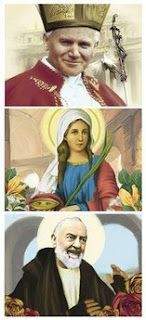I suspect that my Methodist-born mother would have been tickled by this bit of news from, of all places, Rome:
Catholics, Anglicans and Methodists filled Rome’s Basilica of St. Paul Outside the Walls with some of the most famous hymns written by Charles Wesley at a service marking the 300th anniversary of the Methodist reformer’s birth.
The songs, featured in hymnals across denominational lines, were the focal point of the Dec. 3 ecumenical evening prayer service in the Catholic basilica.
The Rev. John Barrett, president of the World Methodist Council said, “It was mind-blowing really” to celebrate Wesley and sing his hymns “in Rome with an ecumenical gathering.”
“I think Charles Wesley would be thrilled. He did not write these hymns just for Methodist people, but because they expressed Christian truths,” Rev. Barrett said.
Cardinal Walter Kasper, president of the Pontifical Council for Promoting Christian Unity, presided over the prayer service and told the congregation it was appropriate to celebrate the anniversary of Wesley’s birth with his songs because it is “through these hymns that Roman Catholics have come to know and appreciate” him.
Charles Wesley and his older brother, John, were Anglican ministers who began the reform movement that eventually became the Methodist church. While John’s break with the Church of England was almost total, Charles continued to serve as an Anglican minister until his death.
The younger Wesley wrote some 6,000 hymns, including “Hark! The Herald Angels Sing,” “Christ the Lord Is Risen Today” and “Love Divine, All Love Excelling.”
Cardinal Kasper said the “eloquent language and theological depth” of Wesley’s hymns address the basic truths of Christian faith that Catholics and Methodists hold in common.
They speak of “God’s universal love made known in Jesus Christ, the call to scriptural holiness and renewal of life, the sacramental life of the church, Christian hope and the presence of the Holy Spirit,” the cardinal said.
Rev. Barrett told the congregation, “Methodism was born in song.” But, unfortunately today even in Methodist congregations his hymns are increasingly replaced by “praise hymns long on emotion but short on theology,” he said.
He said young people seem to find it difficult to sing traditional hymns, and they seem to have difficulty articulating what they believe. “I think the two are related,” he added.
In an interview after the service, he said he thought too many Christians of all denominations are turning to “easy, undemanding worship songs.”
“It is a great pity if you do not sing hymns with a theological content; you will not learn to articulate theological truths,” he said.
You can hear some of Wesley’s great hymns at this website, or this one. You can also read more about him right here.

